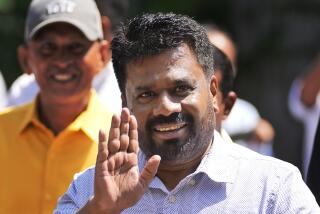Wooed by Populist, Thais Oust Reformist Leader
- Share via
BANGKOK, Thailand — This nation’s voters banished their conservative, reform-minded prime minister Saturday and opted for a new government to be headed by a U.S.-educated telecommunications billionaire who has promised to spend lavishly to revive the sluggish economy.
Although votes were still being tallied early today, Thaksin Shinawatra’s Thais Love Thais Party appeared to have easily garnered enough support to make the populist former policeman Thailand’s 31st prime minister and to set the kingdom on a course that many economists have warned could be ruinous.
All 500 seats in the lower house of parliament were up for grabs in the country’s first election since the passage in 1997 of a “good governance” constitution designed to stamp out corruption and break the power of political oligarchies. As of early today, Thais Love Thais had won about 200 of them, according to exit polls, putting Thaksin in a position to form a coalition government.
“People desire political change, and we have to respect the people’s decision,” Prime Minister Chuan Leepkai said in conceding that his Democrat Party had lost. His government is the first in Thailand in 68 years to fulfill its full parliamentary term.
But Thaksin’s premiership could be brief. He was indicted Dec. 26 by the Counter Corruption Commission for failing to declare all his assets as required by law. If the 15-judge Constitutional Court rejects his appeal--a ruling is not expected for several months--Thaksin will be forced to resign and be barred from holding political office for five years.
Uncertainty also surrounds the election on another front: A spokesman for the Electoral Commission said it had been flooded with complaints of voter fraud, and the five-member body seems certain to overturn some victories and order new elections in the affected constituencies. Official election results, however, are not expected to be announced until next month.
The election was closely watched in Southeast Asia because Thailand has taken bold steps to institute economic and political reforms. With its new constitution and a cluster of new watchdog organizations in place, it is at the forefront of the region’s nascent democratic movement, which has shaken old power bases from Indonesia to the Philippines. The nation’s military chief had promised there would be no coup regardless of the vote’s outcome.
“Clearly, we didn’t clean up the electoral system overnight,” said Pornsak Phongphaew, president of the Thai Political Science Society. “Patronage runs deep, and corruption has always been part of the election process. But I think we made progress, and this election was a little cleaner than others.”
Still, one independent survey estimated that candidates spent $400 million buying votes, and canvassers went door to door in some constituencies on election eve handing out gifts and cash. The government slapped a 30-hour election ban on gambling and the sale of alcohol and warned that “drinkers should not bring up politics, particularly with strangers.”
Throughout Thailand, 140,000 police officers were on duty Saturday to prevent a renewal of the violence that claimed 18 lives during the two-month campaign. Most of the shootouts stemmed from the practice of ward bosses delivering the support of entire villages to whichever candidate promised the most local perks. There were no reports of trouble during the election itself.
“Some politicians figure if it’s not practical to spend 30 million baht [$730,000] to buy the support of a village headman, why not hire a gunman who can accomplish the objective for 300,000 baht?” said Anek Laothamatas, the dean of political science at Thammasat University and a candidate for parliament from Bangkok, the capital.
Political analysts saw the election results not as a repudiation of Chuan’s reform policies so much as a simple desire for change. Both Chuan, 62, and Thaksin, 51, are considered market-friendly, pro-globalization and supportive of good relations with Washington. But while Chuan asked voters for patience with the economy, Thaksin promised quick fixes, and he found a ready audience.
Thaksin, Thailand’s wealthiest high-tech mogul, earned a doctorate in criminology from Sam Houston State University in Texas and started to build his fortune while serving as a police officer in Bangkok, forming a business to sell computers to the police department. He later prospered by providing telecommunications services operated under government concessions.
The grandson of a teak and rice trader, Thaksin served twice as deputy prime minister in the 1990s and briefly held the portfolio of foreign minister in 1995. He was known as thin-skinned in the face of criticism and as having a CEO style of management. He formed Thais Love Thais two years ago as a vehicle to attain the premiership.
More to Read
Sign up for Essential California
The most important California stories and recommendations in your inbox every morning.
You may occasionally receive promotional content from the Los Angeles Times.













